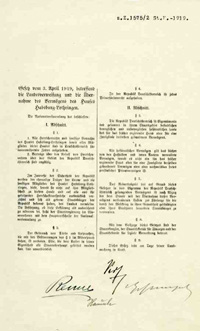
Back Habsburský zákon Czech Habsburgerloven Danish Habsburgergesetz German Ley Habsburgo Spanish Loi de Habsbourg French החוק ההבסבורגי HE Habsburg-törvény Hungarian Hukum Habsburg ID Legge Asburgo Italian ハプスブルク法 Japanese
This article needs additional citations for verification. (August 2009) |

The Habsburg Law (Habsburgergesetz (in full, the Law concerning the Expulsion and the Takeover of the Assets of the House of Habsburg-Lorraine) Gesetz vom 3. April 1919 betreffend die Landesverweisung und die Übernahme des Vermögens des Hauses Habsburg-Lothringen) was a law originally passed by the Constitutional Assembly (Konstituierende Nationalversammlung) of the Republic of German-Austria, one of the successor states of dissolved Austria-Hungary, on 3 April 1919. The law dethroned the House of Habsburg-Lorraine as rulers of the country, which had declared itself a republic on 12 November 1918, exiled them and confiscated their property. The Habsburg Law was repealed in 1935 and the Habsburg family was given back its property. However, in 1938, following the Anschluss, the Nazis reintroduced the Habsburg Law, and it was retained when Austria regained its independence after World War II.
The law has been found to violate human rights, and for this reason, Austria was forced to repeal large parts of it, notably the ban on members of the Habsburg family entering Austria, before being admitted to the European Union in 1995.[1] After a report by the Organization for Security and Co-operation in Europe (OSCE) criticized the prohibition against members of the Habsburg family running for the Austrian presidency, this provision was also withdrawn in June 2011 by the Austrian parliament. Although the law still remains in force, it is considered largely obsolete, with the notable exception of the confiscation of the family's property in force since 1938.[2]
- ^ Zoch, Irene (22 February 2004). "Habsburgs demand return of estates seized by Nazis in 1938". telegraph.co.uk.
- ^ "Stichwort: Habsburger-Gesetz, Habsburger-Paragraf - Politik - News - austria.com". Archived from the original on 6 July 2011. Retrieved 10 July 2011.
© MMXXIII Rich X Search. We shall prevail. All rights reserved. Rich X Search